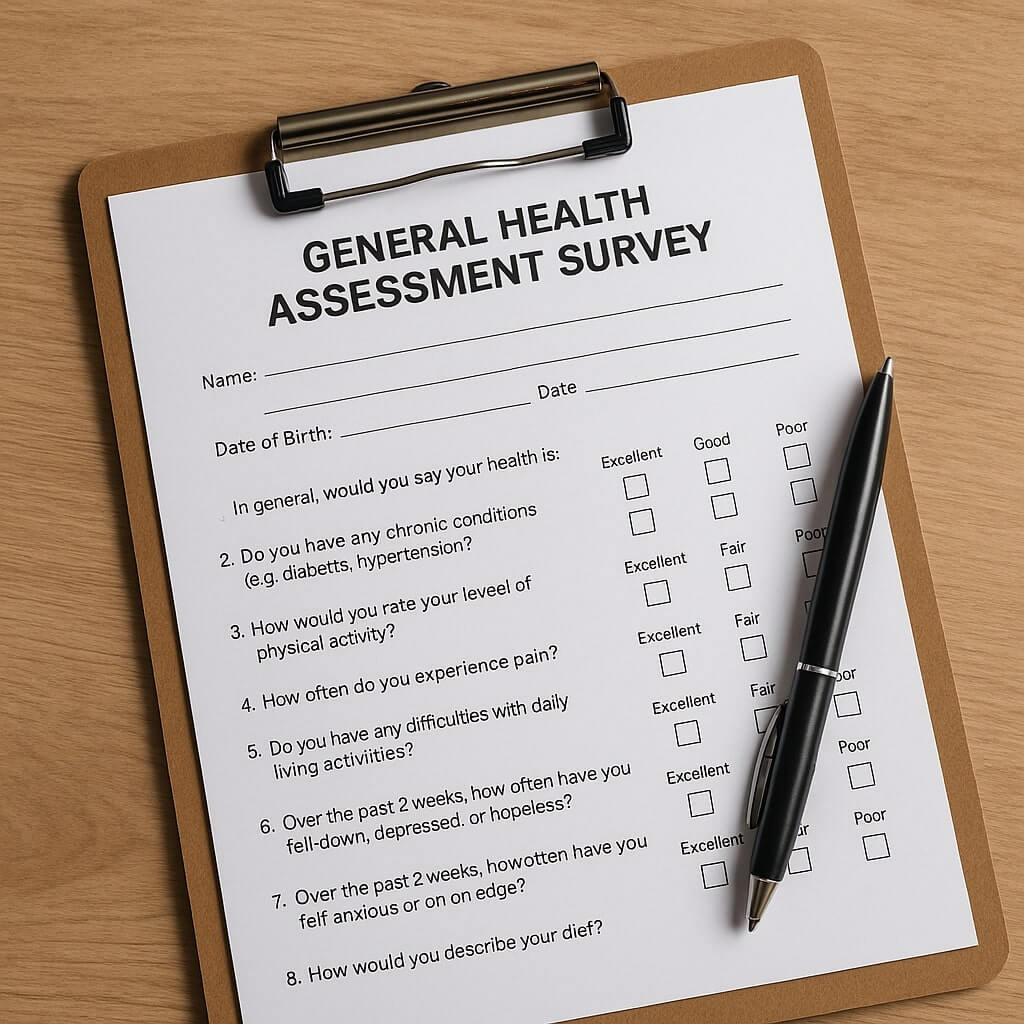A General Health Assessment Survey is a structured tool that evaluates your overall well-being, focusing on various aspects of health. It gathers data on physical and mental health, lifestyle choices, and pre-existing conditions. Understanding this survey’s components can help you identify health risks and manage your well-being more effectively. But what exactly does this survey entail, and how can it impact your health journey?
Key Takeaways
- A General Health Assessment Survey evaluates overall well-being and identifies potential health risks through systematic data collection.
- It encompasses physical health, mental health, lifestyle habits, and existing medical conditions for a comprehensive evaluation.
- The survey facilitates early disease detection, timely interventions, and monitors health trends to improve quality of life.
- Regular participation encourages proactive health management and fosters a culture of prevention within communities.
- Results from the survey help healthcare providers tailor interventions and support for individual health needs.
Understanding the Purpose of a General Health Assessment Survey
A general health assessment survey serves as an essential tool for evaluating an individual’s overall well-being, especially since it can reveal insights that might otherwise go unnoticed.
Understanding the survey purpose is vital; it helps identify health risks, monitor existing conditions, and promote preventive care. By systematically collecting data on various health parameters, you can pinpoint areas needing attention and track changes over time.
The health benefits are significant, as early detection of potential issues can lead to timely interventions, ultimately improving your quality of life. This proactive approach fosters a deeper connection between you and your health management.
Key Components of the Survey
Key components of a general health assessment survey include a range of health indicators designed to provide a thorough view of your well-being.
These indicators often focus on key metrics such as physical health, mental health, lifestyle habits, and existing medical conditions. Each component aims to capture essential data, ensuring survey reliability for accurate assessments.
By evaluating these key metrics, you can identify areas needing improvement and monitor changes over time. This structured approach helps healthcare providers tailor interventions and support, ultimately enhancing your overall health management.
Evaluating key metrics allows for identifying improvement areas and tracking health changes effectively.
Understanding these components is vital for effective participation in the survey process.
Types of Questions Included
In the General Health Assessment Survey, you’ll encounter a variety of questions designed to gauge your overall health.
These include physical health indicators, mental well-being queries, and assessments of your lifestyle habits.
Each type of question serves to provide an extensive view of your health status, ensuring a thorough evaluation.
Physical Health Indicators
Five distinct categories of questions comprise the physical health indicators in the General Health Assessment Survey, providing a thorough view of an individual’s health status.
You’ll encounter queries about your physical fitness, including exercise frequency and duration. Health metrics such as weight, height, and blood pressure are assessed to gauge overall health.
Questions may also cover chronic conditions, medication use, and lifestyle choices like smoking or alcohol consumption. Additionally, sleep patterns and dietary habits are evaluated to understand their impact on your physical well-being.
Collectively, these inquiries offer valuable insights into your physical health and fitness levels.
Mental Well-being Queries
How do you gauge your mental well-being? Evaluating your mental health involves answering specific queries that reflect your emotional resilience.
These questions can help you understand your state of mind and identify areas needing attention. Common types of questions include:
- How often do you feel overwhelmed by stress?
- Do you experience persistent feelings of sadness or anxiety?
- How well do you cope with life’s challenges?
- Are you able to maintain healthy relationships?
Lifestyle Habits Assessment
What lifestyle habits do you engage in that influence your overall health? A Lifestyle Habits Assessment typically asks about your daily routines and choices.
You’ll encounter questions regarding your diet, exercise frequency, sleep patterns, and substance use. These inquiries help identify health behaviors that could lead to necessary lifestyle changes.
For example, are you consuming fruits and vegetables regularly? How many hours do you sleep each night? Understanding these aspects allows for a thorough picture of your health.
Ultimately, this assessment guides you toward making informed decisions to enhance your well-being and encourages positive shifts in your daily habits.
The Importance of Regular Health Assessments
Regular health assessments are essential for early disease detection, allowing you to address potential health issues before they escalate.
Additionally, these assessments help you monitor health trends over time, providing valuable insights into your overall well-being.
Early Disease Detection
While many people may overlook the significance of routine health assessments, these evaluations play a crucial role in the early detection of diseases.
Regular health screenings can help identify potential health issues before they escalate, allowing for timely intervention and treatment. By prioritizing these assessments, you can benefit in several ways:
- Increased chances of successful treatment
- Reduced healthcare costs over time
- Early identification of risk factors
- Improved overall health outcomes
Engaging in regular disease screening guarantees that you maintain your health proactively, ultimately leading to a longer, healthier life.
Don’t underestimate the power of early detection.
Health Trend Monitoring
Health assessments aren’t just about spotting diseases; they also play an essential role in monitoring health trends over time. By regularly collecting health data, you can conduct trend analysis that highlights changes in your well-being. This proactive approach helps you identify potential issues before they escalate.
| Year | BMI Change | Blood Pressure Trend |
|---|---|---|
| 2020 | +1.2 | Stable |
| 2021 | +0.5 | +5 mmHg |
| 2022 | +0.3 | +3 mmHg |
| 2023 | -0.2 | Stable |
| 2024 | -1.0 | -4 mmHg |
Regular assessments empower you to make informed health decisions.
How to Prepare for a Health Assessment Survey
Preparing for a health assessment survey requires careful consideration of various factors that can impact the accuracy of the results.
Preparing for a health assessment survey involves careful thought on factors that may influence result accuracy.
To guarantee you’re ready, follow these preparation tips:
- Review your medical history and current medications.
- Maintain a consistent routine leading up to the survey.
- Confirm you’ve completed any necessary pre-survey requirements, like fasting.
- Gather any relevant documents or forms needed for the assessment.
Interpreting Your Results
Understanding your results is essential, as they provide valuable insights into your overall health and well-being. When conducting result analysis, focus on key metrics, such as blood pressure, cholesterol levels, and BMI. Each data point contributes to your health profile and can indicate potential risks.
Data interpretation involves comparing your results to standard ranges to identify areas needing attention. Pay close attention to patterns or anomalies that may signify underlying issues.
A thorough understanding of these results empowers you to make informed decisions about lifestyle changes or seek further medical evaluation, ensuring you take proactive steps toward better health.
Common Follow-Up Actions
Once you’ve interpreted your results, the next step is to contemplate common follow-up actions that can help address any concerns raised by your health assessment.
These follow-up recommendations should focus on effective health improvement strategies tailored to your specific needs.
- Schedule a consultation with a healthcare professional for personalized advice.
- Implement lifestyle changes based on identified risk factors.
- Regularly monitor your health indicators to track progress.
- Engage in community resources or support groups for additional motivation.
Encouraging Preventive Health Measures
While many individuals prioritize addressing health concerns after they arise, adopting preventive health measures can considerably enhance overall well-being.
Engaging in regular preventive screenings allows you to detect potential health issues early, reducing the risk of severe complications.
Furthermore, participating in wellness education empowers you with knowledge about healthy lifestyle choices, including nutrition and exercise.
By prioritizing these proactive strategies, you not only safeguard your health but also foster a culture of prevention within your community.
Conclusion
To sum up, a General Health Assessment Survey is essential for understanding your overall well-being. By systematically evaluating your physical and mental health, lifestyle habits, and medical history, you can identify potential risks and take proactive steps toward better health. Regular assessments not only enable early disease detection but also empower you to make informed decisions about your care. Ultimately, embracing this tool fosters a culture of preventive health, enhancing both your quality of life and long-term wellness.




